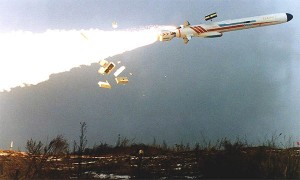Special to WorldTribune.com
WASHINGTON — Israel has determined that the Iranian-sponsored Hizbullah received an advanced Russian cruise missile.
Israeli sources said Hizbullah acquired the Russian-origin P-800 coastal defense system in 2013. The sources said components of the system were transferred to Hizbullah headquarters in Lebanon by the regime of Syrian President Bashar Assad, which received the anti-ship cruise missiles two years earlier.

“They don’t have the entire system, but they soon might have complete missiles,” a source said.
The sources said Israeli assessment was shared by the U.S. intelligence community. They said the Assad regime transferred components of the P-800, particularly the Yakhont missile, in early 2013. The Israel Air Force responded with at least five strikes on suspected Hizbullah convoys as well as Syrian military warehouses that contained the Russian missiles.
U.S. officials asserted that P-800 components have escaped Israeli surveillance and reached Hizbullah bases in Lebanon. They said up to 12 Yakhont guided-missile systems could be under Hizbullah control in Lebanon in an effort overseen by Iran’s Islamic Revolutionary Guard Corps.
“To make it lethal, a system needs to be complete,” a senior U.S.
defense official told the Wall Street Journal on Jan. 2.
Yakhont, launched by mobile vehicles, was said to be one of the most
advanced anti-ship cruise missiles. The radar-guided weapon, with a speed of
Mach 2, contained a range of 300 kilometers, sufficient to threaten shipping
along the Israeli coast.
“But beyond range, it’s the radar guidance that has IDF planners
worried,” the Journal said.
Officials said the Israeli air strikes failed to destroy Syria’s P-800
fleet. They said Syria has acquired nearly 100 Yakhont missiles from Russia,
which pledged that the weapons would not be transferred to Hizbullah, with
an arsenal of 100,000 missiles and rockets.
Over the last two months, Israel was said to have aborted several
additional strikes on Syria. The officials also reported the Hizbullah
acquisition of the Scud D, a North Korean missile with a range of up to 700
kilometers.
“Hizbullah and Syria are continually being strengthened, and once a week
a Russian ship unloads weapons in Syrian ports,” a senior Israel Navy
officer told the Ynet website.
At this point, Israel has sought to develop systems to intercept
Yakhont. One system was identified as the Barak-8, a ship-based missile
defense system also sold to India.
“There are systems that could protect against Yakhont, but it will take
time to build a capability sufficient to stop a major attack,” the source
said.

You must be logged in to post a comment Login